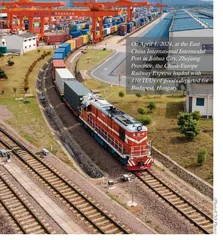The Transformation of Economic Globalization and China’s Role in It Under Profound Changes Unseen in a Century
作者: Chen Jianqi

The world economy prospers when it is open, but declines when it is closed. Since the end of the cold war, economic globalization has developed rapidly, forming a new global development pattern that features intertwined interests of countries all over the world. The report to the 20th National Congress of CPC pointed out that at present, changes in the world, times and history are unfolding in a way unseen in the past. Deficit in peace, development, security and governance are aggravating, and human society is facing unprecedented challenges. Globalization has encountered headwinds, and the world has entered a new period of turbulence and change. It’s both the fundamental measures to promote world economic development and the inevitable choice of China to promote high-quality development to follow the development law of globalization, abandon anti-globalization thinking and come up with new ideas of globalization development.
Driving Force and Pressure of Economic Globalization Transformation under Profound Changes unseen in a Century
Changes in the past century have brought great uncertainty to globalization. Unilateralism and protectionism are on the rise, and the COVID-19 pandemic has inflicted new impacts on open cooperation. The industrial and supply chains are facing reconstruction, which has increased the pressure of economic globalization. From a historical perspective, globalization represents the general trend, and the transformation of globalization is highly charged. The development of globalization strongly promotes the rapid growth of the world economy and constitutes an important driving force for the progress of human society. Major countries in the world attach great importance to and formulate opening-up strategies and as it turns out, benefit from globalization through deepening open cooperation. The digital economy is becoming a new form of development amid changes in the world, with breeding technological revolutions such as artificial intelligence. The world economy is undergoing a period of deep change, and the pressure and drivers of economic globalization and transformation are accumulating.
I. Driving Force of Economic Globalization Transformation
Economic globalization refers to the historical process of constantly reducing various barriers that hinder the free circulation of commodities and production factors among countries in the world, and gradually forming and constantly improving international rules that regulate the free circulation of commodities and production factors around the world. Economic globalization includes trade, financial and production globalization, which converge with each other, feed on each other and continuously evolve. Economic globalization has catalyzed economic competition and cooperation among countries, thereby generating great changes in the pattern of international trade, finance and division of labor. Globalization brings together capital, technology and information beyond national boundaries and creates a single global market, which is vividly summarized by American writer Thomas Friedman as “a flat world”.
The scientific and technological revolution and modern institutional reform constitute the external driving force for the transformation of economic globalization. An observation of the development process of economic globalization will find that the breadth and depth of contemporary globalization have gone beyond any previous period, mainly due to two favorable conditions. First, the modern scientific and technological revolution reduces the communication cost and transportation time between different countries and regions, making the world a “global village” and creating objective conditions for contemporary economic globalization. Second, the deepening of market economic system reform in major countries in the world has created a common market system for economic globalization. The reform of the international financial order promotes the free flow of capital and provides financial support for economic globalization. The end of the cold war has created a peaceful environment for economic globalization. Under the above conditions, multinational enterprises with advanced technology, management experience and capital make production and investment projects globally, which has become an important subject to promote the in-depth development of economic globalization. The World Trade Organization, the International Monetary Fund and the World Bank have served as institutional guarantees for the in-depth development of globalization.
Great changes in the world over the past century are the direct cause of the transformation and upgrading of economic globalization. At present, great changes unseen in the past century not only shape the new environment of economic globalization, but also transfer the cooperative thinking concept of all countries, and even give rise to the deep-seated reform of the traditional economy. Only through transformation can economic globalization keep abreast with the times. Under the current situation, developed economies’ contribution to global growth is waning, and the globalization dominated by hegemony of the United States and the Western countries proves difficult to sustain. Emerging market economies and developing countries have become important driving forces for global development and actively worked to promote a fairer and more rational new globalization. At the same time, great changes over the past century give birth to technological revolution, which relies on the Internet to break through the traditional national boundaries, actively shape a decentralized new environment for global cooperation, and promote the simultaneous transformation of economic globalization underpinned by the traditional economic cooperation model.